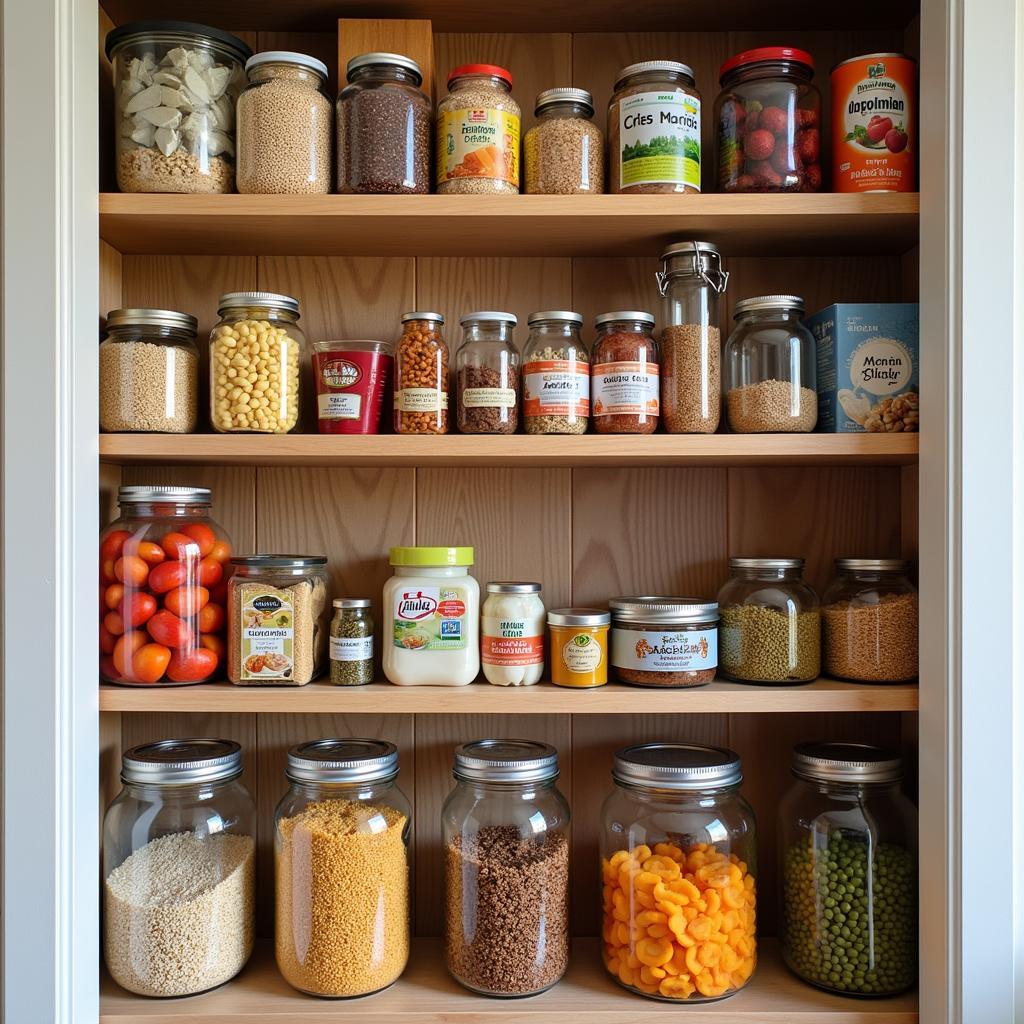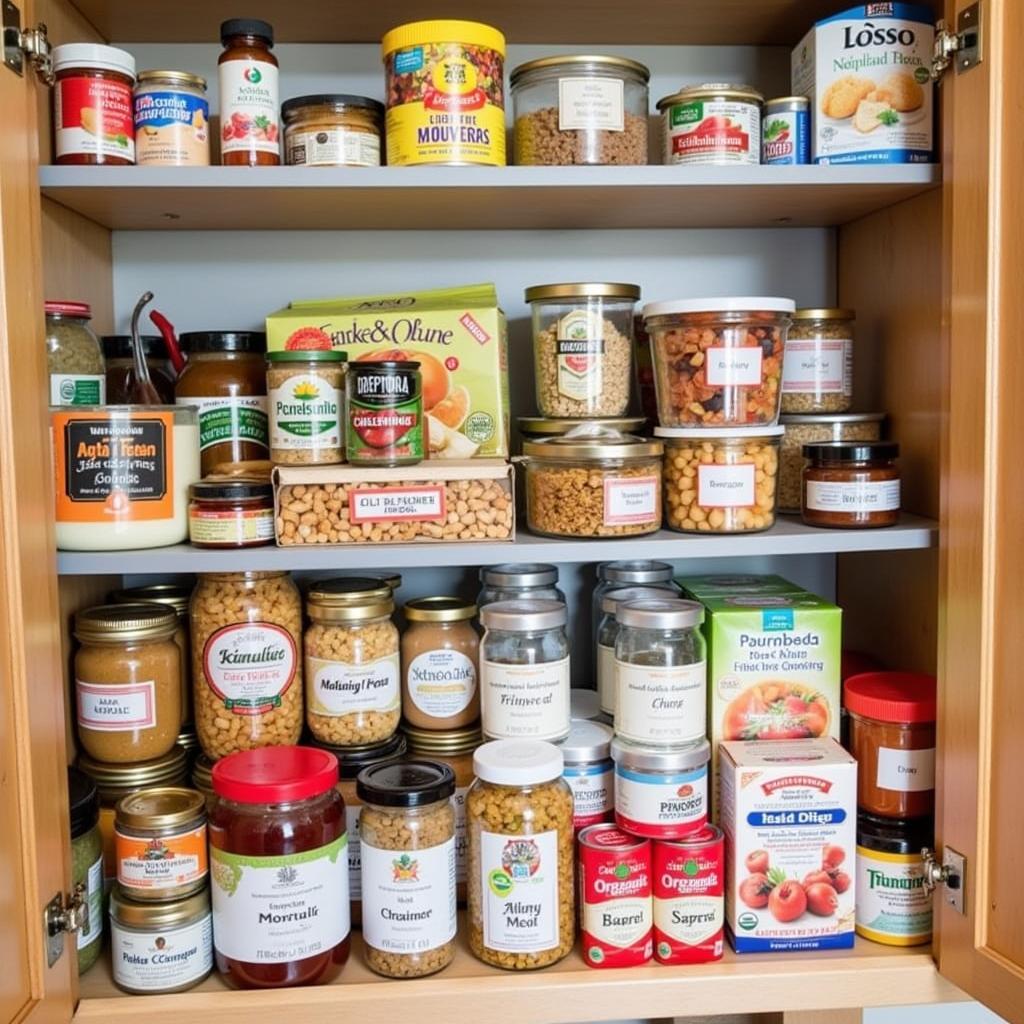In a world that’s increasingly unpredictable, ensuring your family’s well-being means being prepared for anything. That’s where having an emergency food supply, particularly one that prioritizes organic options, becomes less about “stocking up” and more about building a secure and healthy foundation for the future. But where do you even begin?
 Well-stocked pantry with organic emergency food supplies
Well-stocked pantry with organic emergency food supplies
Why Choose Organic for Your Emergency Food Supply?
You meticulously read labels at the grocery store, prioritizing organic produce and ethically sourced ingredients. So why should your emergency food supply be any different? Here’s why embracing organic extends beyond your everyday meals:
- Sustained Wellness: Organic foods are naturally free from synthetic pesticides and fertilizers, substances that can have long-term health implications. In a crisis, maintaining good health is paramount, and choosing organic aligns with that goal.
- Environmental Responsibility: Supporting organic farming practices, even in your emergency preparedness, contributes to a healthier planet. Organic agriculture prioritizes soil health and biodiversity, crucial factors in building a resilient food system for the future.
- Enhanced Flavor: Let’s face it, facing challenging times doesn’t mean sacrificing flavor. Organic foods, especially fruits, vegetables, and grains, often boast richer, more complex tastes that can make a real difference in your meals.
 Family enjoying a meal by candlelight during a power outage
Family enjoying a meal by candlelight during a power outage
Navigating the World of Organic Emergency Food Options
Building an emergency food supply kit that aligns with your organic values might seem daunting, but it doesn’t have to be. Here’s a breakdown of what to consider:
1. Shelf-Stable Staples
Think long-lasting, nutrient-rich ingredients that form the foundation of any well-stocked pantry:
- Grains: Quinoa, brown rice, oats, and pasta (look for whole-wheat or lentil-based options) provide essential carbohydrates for energy.
- Beans and Legumes: Lentils, chickpeas, black beans, and kidney beans are packed with protein and fiber, offering both sustenance and flavor.
- Canned Goods: Tomatoes, coconut milk, vegetables (choose low-sodium options), and fruits (packed in water or their own juice) add essential vitamins and minerals.
- Nuts and Seeds: Almonds, walnuts, chia seeds, and flax seeds are excellent sources of healthy fats and protein.
- Dried Fruits: Mangoes, cranberries, apricots, and raisins offer a naturally sweet treat and a good source of energy.
2. Freeze-Dried Delights
Freeze dried camping food isn’t just for outdoor adventures. These lightweight, shelf-stable meals are becoming increasingly popular for emergency preparedness due to their convenience and long shelf life. Look for companies that prioritize organic ingredients in their freeze-dried meals and snacks.
3. Water: The Ultimate Essential
While technically not food, having an adequate supply of clean drinking water is non-negotiable in any emergency. Store at least one gallon per person per day. Consider investing in a water filtration system for long-term preparedness.
Building Your Organic Emergency Food Supply: A Step-by-Step Guide
Creating a well-rounded organic survival food stash doesn’t have to be overwhelming. Here’s a simple approach:
- Start Small: Begin by gradually incorporating a few organic staples into your regular grocery shopping.
- Prioritize Variety: Choose a range of foods that you and your family enjoy eating. This ensures you’ll actually want to consume your emergency supplies if the need arises.
- Check Expiration Dates: Regularly rotate your emergency food supply, consuming older items before they expire and replenishing your stock.
- Store Properly: Keep your emergency food supply in a cool, dry, and dark place to maintain freshness and extend shelf life.
- Don’t Forget Special Needs: Consider any dietary restrictions or allergies within your family and include appropriate alternatives in your supply.
Finding the Best Organic Emergency Food Supply: What to Look For
Navigating the world of emergency preparedness can feel overwhelming. When choosing an emergency food supply, especially one that aligns with your organic values, keep these factors in mind:
- Ingredient Quality: Look for brands that are transparent about their sourcing and use certified organic ingredients whenever possible.
- Nutritional Value: Choose food items that offer a good balance of protein, carbohydrates, healthy fats, and essential vitamins and minerals.
- Taste and Palatability: Emergency preparedness shouldn’t mean sacrificing flavor. Select food items that you and your family will actually enjoy eating.
- Packaging and Shelf Life: Opt for food items with durable packaging that can withstand temperature fluctuations and have a long shelf life.
Investing in Peace of Mind
Building an emergency food supply organic is about more than just physical preparation; it’s about cultivating a sense of security and self-reliance. It’s about knowing that no matter what challenges life throws your way, you’re equipped to nourish yourself and your loved ones with healthy, wholesome food.
 A woman meticulously organizing her emergency food supply in a basement storage area.
A woman meticulously organizing her emergency food supply in a basement storage area.
FAQs About Building an Organic Emergency Food Supply
1. Is organic emergency food significantly more expensive?
While organic options might have a slight price premium, the difference is often minimal when compared to the long-term health benefits and peace of mind it provides.
2. Where is the best place to buy freeze dried food?
Many online retailers specialize in organic and non-GMO freeze-dried meals. Additionally, some health food stores also carry a selection of freeze dried camping food.
3. Can I use my emergency food supply for camping trips?
Absolutely! Many emergency food items are lightweight, compact, and perfect for outdoor adventures.
4. What about water filtration for an emergency?
Investing in a water filter or purifier is crucial for long-term emergency preparedness. It allows you to safely consume water from various sources.
5. How often should I rotate my emergency food supply?
It’s best to check expiration dates annually and consume or donate items before they expire, replenishing your stock accordingly.
Need help with your organic emergency food plan?
Contact us! Our dedicated team at Mina Cones Food is available 24/7 to assist you. Reach us at:
- Phone Number: 02437655121
- Email: minacones@gmail.com
- Address: 3PGH+8R9, ĐT70A, thôn Trung, Bắc Từ Liêm, Hà Nội, Việt Nam.